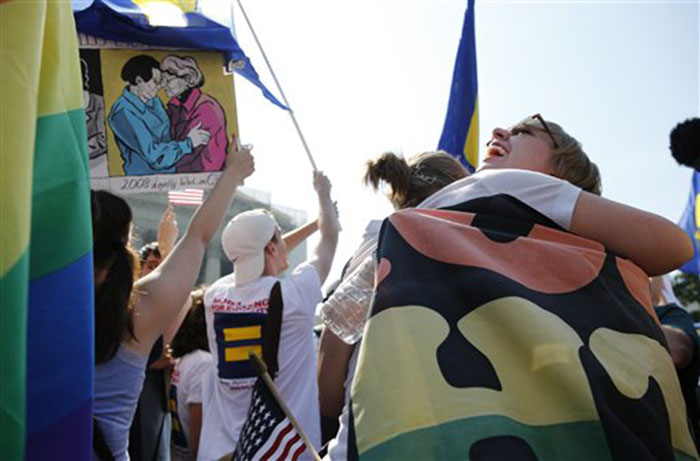WASHINGTON — Chanting “DOMA is Dead,” supporters of same-sex marriage burst into cheers and some wept openly upon hearing word of the Supreme Court’s decision Wednesday striking down a federal law defining marriage as a union between a man and a woman.
Some in the crowd hugged and others jumped up and down just after 10 a.m. EDT Wednesday when the decision was announced. Many people were on their cell phones monitoring Twitter, news sites and blogs for word of the decision. And there were cheers as runners came down the steps with the decision in hand and turned them over to reporters who quickly flipped through the decisions.
Chants of “Thank you” and “USA” came from the crowd as plaintiffs in the cases descended the court’s marbled steps.
Sarah Prager, 26, cried and was shaking when she heard the news, and she and a stranger hugged. Prager, who married her wife in Massachusetts in 2011, said she was in shock. “Oh that’s so good. It’s just really good,” she said.
“I’m in shock. I didn’t expect DOMA to be struck down,” she said through tears and shaking. Prager was referring to the Defense of Marriage Act, signed into law by President Bill Clinton in 1996. Gay rights activists had argued that the law effectively denied same-sex married couples the federal benefits that heterosexual couples enjoyed.
Amanda Klinger, 29, and Caroline Hunt, 26, of Washington, DC, were awaiting the ruling anxiously.
Hunt said she cried and jumped up and down when she heard the news from a neighbor in the crowd, said she felt “relieved.” Klinger said she no longer feels like “a second class citizen.” The two are planning a wedding in Massachusetts in August and planned a civil ceremony in DC before. They said they planned to celebrate Wednesday’s decisions by going to the D.C. courthouse and applying for a marriage license.
A large crowd had thronged to the high court’s plaza earlier to await not only the decision on DOMA, but also a ruling on whether a constitutional amendment in California prohibiting gay marriage could stand the test of challenge.
In that second case, the justices cleared the way for same-sex marriage in California by holding that defenders of California’s gay marriage ban did not have the right to appeal lower court rulings striking down the ban.
The court’s 5-4 ruling in that case left in place the initial trial court declaration that the ban was unconstitutional. California officials probably will rely on that ruling to allow the resumption of same-sex unions in about a month’s time.
Most of the people who spilled across the sidewalk in front of the court were gay marriage supporters. One held a rainbow flag and another wore a rainbow shawl, and a number of people carried signs with messages including “2 moms make a right” and “‘I Do’ Support Marriage Equality.” Others wore T-shirts including “Legalize gay” and “It’s time for marriage equality.” At several points the crowd began a call and response: “What do we want? Equality. When do we want it? Now.”
Larry Cirignano, 57, was in the minority with a sign supporting marriage only between a man and a woman. He said he drove four hours from Far Hills, N.J., because he believed all views should be represented. He said he hopes the court follows the lead of 38 states that have defined marriage as between one man and one woman
George Washington University student Philip Anderson, 20, came to the court with a closet door that towered above his head. He had painted it with a message opposing the federal Defense of Marriage Act, which defines marriage as between one man and one woman and which the court is considering. His door read: “This used to oppress me. Repeal DOMA; Now. No more shut doors.”
Thirty-four-year-old Ian Holloway of Los Angeles got to the court around 7 a.m. to try to get a seat inside the courtroom. Holloway said he and his partner had planned to get married in March but when the justices decided to hear the case involving California’s ban on gay marriage they pushed back their date.
He said, “We have rings ready. We’re ready to go as soon as the decision comes down.” Holloway said he was optimistic the justices would strike down Proposition 8, which banned gay marriage in California.
Send questions/comments to the editors.



Comments are no longer available on this story